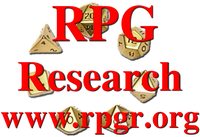Updated list of goals for the RPG Research Project
Over many years, the long term intention of RPG Research is to implement a series of studies using many different population groups meeting the following goals:
-
Attempt to verify or invalidate existing correlative and meta-research results. Much of the existing research is dated from the 1980's and 1990's. Attempt to bring the research up to date, and verify if there are any statistically significant differences found between role-playing gamers and the general populace, at difference age and other demographic levels. Topics to check/verify: levels of depression, social alienation, IQ, personality types, incidents of occultism, belief in paranormal, emotional stability, dissociation, suggestibility, incidents of substance abuse/addiction, suicide rates, antisocial personality traits, problem solving skills, math skills, verbal skills, writing skills, research skills, history skills, spacial relations, organizational skills, team coordination skills, leadership skills, strength of ethics, morality, convictions, religious belief, feelings of social alienation or stigma, criminal behavior/history, propensity for violent thoughts or behaviors, adaptive versus rigid/maladaptive personality traits, aggressive/competitive versus cooperative, racial and gender stereotype attitudes, foreign language adoption levels, levels of empathy, deviancy, pathology, levels of mental illness and/or co-morbidity, and demographics statistics.
-
Attempt to differentiate between correlative and causal data related to role-playing gamers. When possible, use blind, double blind, and triple blind study methodologies.
-
Determine if the correlative tests indicating significant differences in role-playing gamers from the general populace, are a causal result of their participation in role-playing games? Or is it because they already had significant differences, and were attracted to role-playing games because of these differences? For example, are role-playing gamers better problem solvers because of engaging in the activity or role-playing gaming which helped them develop new or better problem solving skills? Or are are they drawn to the activity because they are already inherently adept problem solvers, and enjoy applying their aptitude to such an environment as role-playing games provide.
-
Determine if there are any correlative demographic idiosyncrasies in variables found between intensely dedicated role-playing gamers, more casual but experienced role playing gamers, and the general population. For example, are there any noticeable differences in employment rates, income, household ownership, marriage status, children, ethnicity, religion, etc.
-
Determine if there are any repeatable causal influences on those who participate regularly in role playing gaming recreational activities. Many possible variables could be evaluated, such as problem solving, mood, social skills, etc.
-
If there are indicators that role-playing games have a causal impact on participants, attempt to determine if there are any differentiations in impact on test subjects between "heroic" and "evil" game campaign settings.
-
Determine if any differentiation exists between participants of different role playing gaming forms such as classic paper and dice tabletop RPGs, compared to live action role playing games (LARP), or computer-based role playing games.
-
Perform bio-feedback and neuro-feedback analysis on role-playing gamers before, during, and after gaming sessions to determine if any measurable effects are observable by these media.
- Apply neuro-imaging analysis between long-time gamers and non-gamers for comparison and any correlative differences.
- Apply neuro-imaging on participants before, during, and after participation in role-playing games using FMRI (Functional Magnetic Resonance Imaging) and PET (Positron Emission Tomography) to determine the measurable activity and/or if there are any longer term physiological changes of the brain.
- If data indicates potential causality, attempt to narrow and clarify the variables, looking for any differentiations in results.
- Determine optimal duration of game sessions for maximal benefit. Variables would include determining the ideal duration of each session, how frequently to repeat the sessions, and how many sessions are sufficient for long term impacts.
-
Determine if any differences are indicated from participation in shorter single sessions versus longer "campaigns" over different durations.
-
Determine if different game systems such as Dungeons & Dragons versus Lord of the Rings role-playing gaming, have any measurable differences in effect on the participants.
-
Determine if different role-playing game genres have any measurable differences. Examples include comparing fantasy-based role-playing games to horror, science fiction, cowboy westerns, anime and comic book characters, historical or religious settings, etc.
- Within a specific genre, determine if different campaign settings have any measurable differences in specific therapeutic or educational influences on participants.
-
Determine differences between various populations and cultures in response to participating in role-playing games. For example the claimed significant gender differential in participation with tabletop role-playing games, or any differences in the Deaf community, or differences from other countries and cultures, etc.
-
Determine ideal environment settings for sessions. Variables would include temperature, seating arrangements, lighting, olfactory stimulus, auditory stimulus, and other related variables.
-
Determine if there are any repeatable "positive" or "negative" statistically significant characteristics that can clearly be defined, and might be most useful as a therapeutic treatment or educational tool, either separately or in conjunction with other modalities.
-
Experiment with creating “adventure modules” specifically designed to address targeted population needs such as socialization issues between different groups in the Deaf Community, people suffering from unipolar depression, bipolar, PTSD, Autism, Aspergher's, ADD/ADHD, Alzheimer's, traumatic brain injury recovery, schizophrenia, and other social, therapeutic, or educational needs. An example includes attempting to deliver measurable benefits over a typical 6-8 week course, comparable to some other treatment modalities.
-
If indicated, define the requirements for a Game Master Therapist (GMT) or Game Master Instructor (GMI) in applying a role-playing game therapeutic or educational module.
-
As research progresses, continue to adjust various hypotheses according to the data gathered, and update research goals accordingly.
- Establish industry standard practices and create Role-playing Gaming Therapy Handbook of Practice.
Document Actions

